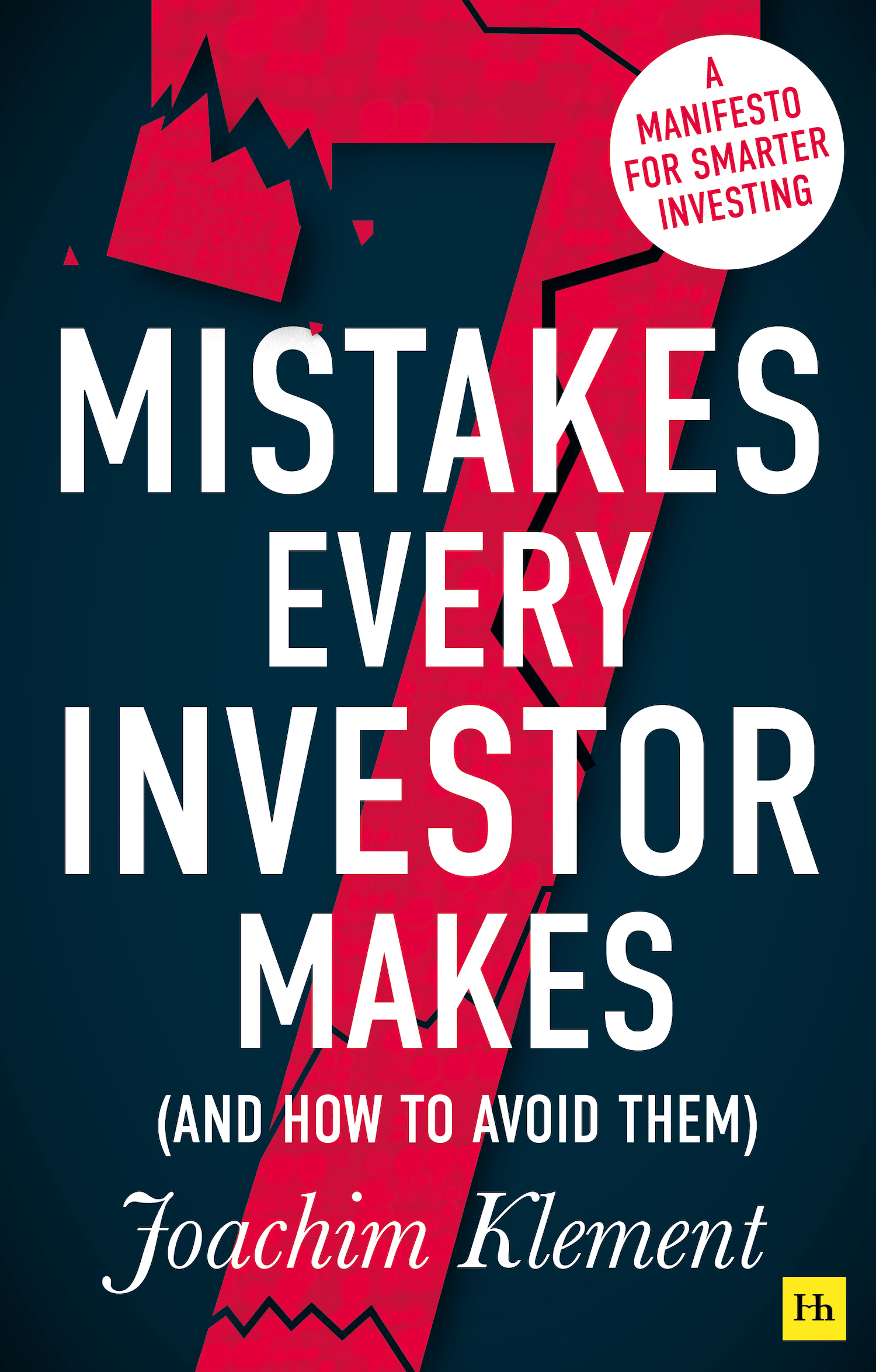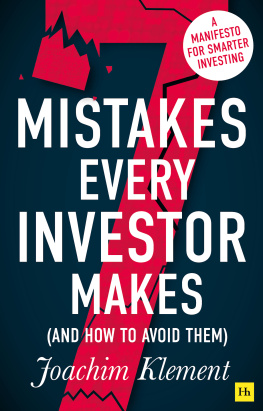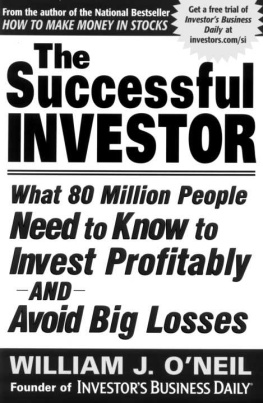Joachim Klement - 7 Mistakes Every Investor Makes (And How To Avoid Them)
Here you can read online Joachim Klement - 7 Mistakes Every Investor Makes (And How To Avoid Them) full text of the book (entire story) in english for free. Download pdf and epub, get meaning, cover and reviews about this ebook. year: 2020, genre: Business. Description of the work, (preface) as well as reviews are available. Best literature library LitArk.com created for fans of good reading and offers a wide selection of genres:
Romance novel
Science fiction
Adventure
Detective
Science
History
Home and family
Prose
Art
Politics
Computer
Non-fiction
Religion
Business
Children
Humor
Choose a favorite category and find really read worthwhile books. Enjoy immersion in the world of imagination, feel the emotions of the characters or learn something new for yourself, make an fascinating discovery.
- Book:7 Mistakes Every Investor Makes (And How To Avoid Them)
- Author:
- Genre:
- Year:2020
- Rating:4 / 5
- Favourites:Add to favourites
- Your mark:
- 80
- 1
- 2
- 3
- 4
- 5
7 Mistakes Every Investor Makes (And How To Avoid Them): summary, description and annotation
We offer to read an annotation, description, summary or preface (depends on what the author of the book "7 Mistakes Every Investor Makes (And How To Avoid Them)" wrote himself). If you haven't found the necessary information about the book — write in the comments, we will try to find it.
7 Mistakes Every Investor Makes (And How To Avoid Them) — read online for free the complete book (whole text) full work
Below is the text of the book, divided by pages. System saving the place of the last page read, allows you to conveniently read the book "7 Mistakes Every Investor Makes (And How To Avoid Them)" online for free, without having to search again every time where you left off. Put a bookmark, and you can go to the page where you finished reading at any time.
Font size:
Interval:
Bookmark:

7 Mistakes Every Investor Makes and How To Avoid Them
A manifesto for smarter investing
Joachim Klement

Contents
About the Author
Joachim Klement is a research analyst and former chief investment officer with 20 years experience in financial markets. He spent most of his career working with wealthy individuals and family offices advising them on investments and helping them manage their portfolios. He also managed equity portfolios for banks and independent asset managers. Most recently, Joachim worked as head of investment research for a small investment bank in the City of London, helping pension funds, insurance companies and other institutional investors understand the chaos of todays market and make better investment decisions. Throughout his career, Joachim has worked with individual investors and institutions from the US to Europe and Asia.
Joachim studied mathematics and physics at the Swiss Federal Institute of Technology (ETH) in Zurich, Switzerland and graduated with a masters degree in mathematics. During his time at ETH, Joachim experienced the technology bubble of the late 1990s first hand. Through this work, he became interested in finance and investments and studied business administration at the Universities of Zurich and Hagen, Germany, graduating with a masters degree in economics and finance and switching into the financial services industry in time for the run-up to the financial crisis. His friends tell him never to switch industries again, since a few years after, the entire industry tends to collapse.
Acknowledgements
Writing this book has felt like a pregnancy. I have been carrying more and more weight around with me and then, in one quick but painful rush, it popped out. But, as with every pregnancy, one cannot do it alone. I would like to thank first and foremost my editor, Craig Pearce, along with the entire team at Harriman House, all of whom have helped this project come to fruition in a sense, they were the midwife that supported me through the process of giving birth. And like all midwives around the world, they deserve lots of praise for what they do. Thank you also to the great team at the Naval and Military Club in London, where most of this book was written. It was a great place to go to work and focus on the task s at hand.
But as I said, this book did not come out of nothing and is the product of years of research and conversation with many people. I would especially like to thank two mentors of mine, Prof. Klaus Wellershoff and the late Andreas Hfert, who have taught me more about economics, investments and the art of critical thinking than anybody else. I owe them a lot of gratitude for the many discussions and support they have given me over the years. Furthermore, I want to thank the sons of Klaus Wellershoff, whose reality hits you hard, bro had to make it into this book. It was just too good to be missed.
Over the past two years, I have spoken to many people who have encouraged me to write this book and helped me refine its contents. It all started with a series of short papers that I wrote for Fidante Partners which, after being deemed too risky for the business, were never published. As I told my wonderful boss, Cathy Hales, and my colleague, Gihan Ismail, at the time, even though it wont be published with a Fidante brand, it might still lead to something else. Thank you both for giving me the leeway to spin my crazy ideas and letting me push the envelope. And thank you for all the support and encouragement you have given me, no matter where my crazy ideas led.
There is also a whole list of people who provided discussion, invaluable feedback on draft versions of this book or input to the original papers on which it is based: Brett Arends, Dewi John, Tim Koroknay, Sam Morris, Larry Siegel, Paolo Sironi, Jason Voss and Jason Zweig. Thank you all very much.
Finally, and most importantly, I want to thank my wife, Robin Miranda, who is my most enthusiastic supporter, my fiercest critic and always asks the right questions. Without her, none of this could have happened. This book is dedicat ed to her.
Introduction, or How a Relay of Misery Can Lead to Good Things
I always wanted to write a self-help book. You know the kind of book: if you follow these three steps, you will get rich, smart, beautiful, etc. When it comes to investing, these books have titles like The Instant Millionaire or I Invested in Amazon at the IPO: Here is how you can find the next Amazon. My friends and I call them investment porn. Most of the time, the only people with any chance of becoming an instant millionaire with these books are th e authors.
My problem is that I am plagued by this thing people call conscience or integrity. I know, its such a 20th century thing. We live in the 21st century, when the ability to ignore pesky little things like facts and data has seemingly become a necessary condition of a political or business leader. If you want to gain a large following these days, it seems your promises have to be big and your delusions even bigger. But I have news for you: you can only ignore facts and data for so long before eventually reality hits you hard, bro, as the kids of a friend of mine us ed to say.
My career as an investor started in the late 1990s during the technology bubble, when investors were convinced that the internet would revolutionise the world. Every business that was involved in the new economy attracted more money than it could spend and saw its valuations go through the roof.
I was in the middle of this hype myself. On the one hand, I invested in technology stocks in the late 1990s and lost a large amount of money when the bubble burst in the early 2000s. But, on the other hand, I was working in this new economy. I was helping to run a small spin-off company at my university that helped people find jobs via the internet.
I know this sounds quaint today, but back in the mid-1990s setting up a job site on the internet was revolutionary. And business was going well. We made so much money with our little internet company that we couldnt spend it fast enough. And since we were all volunteers and had regular day jobs, we didnt have the time to grow the company aggressively. But with the success of this company came the delusion that starting and running a business was easy.
How wrong we were. In early 2000, the companys revenue dried up almost instantaneously and our sense of self-importance crashed together with the business. Our saving grace was that we had other jobs and had not burnt through the money the business made in the good times. These savings helped the business survive for the next three years, when it finally stopped los ing money.
Today, the company still exists but, just like a quarter century ago, it is a small business run by graduates of my alma mater as a hobby. Nobody ever got rich from it but, over the years, countless graduates had the chance to learn what it takes to run a business on a day-to-day basis. And the business allowed them to make mistakes on a small scale without endangering their li velihoods.
The mistakes I made during the technology bubble, both in running a business and as an investor, stayed with me for the rest of my life. They inform my decisions to this day and will likely continue to do so.
But while these mistakes were amongst the first I made, they were by no means the last. Instead, they just set me off on what I like to call my personal relay of misery. Sometimes, I look back at my career as an investor and it seems like I just went from one mistake to the next. The fact is, investing is not simple. No matter what self-help books try to tell us, there is no simple or quick way to success. Mistakes are i nevitable.
Font size:
Interval:
Bookmark:
Similar books «7 Mistakes Every Investor Makes (And How To Avoid Them)»
Look at similar books to 7 Mistakes Every Investor Makes (And How To Avoid Them). We have selected literature similar in name and meaning in the hope of providing readers with more options to find new, interesting, not yet read works.
Discussion, reviews of the book 7 Mistakes Every Investor Makes (And How To Avoid Them) and just readers' own opinions. Leave your comments, write what you think about the work, its meaning or the main characters. Specify what exactly you liked and what you didn't like, and why you think so.








